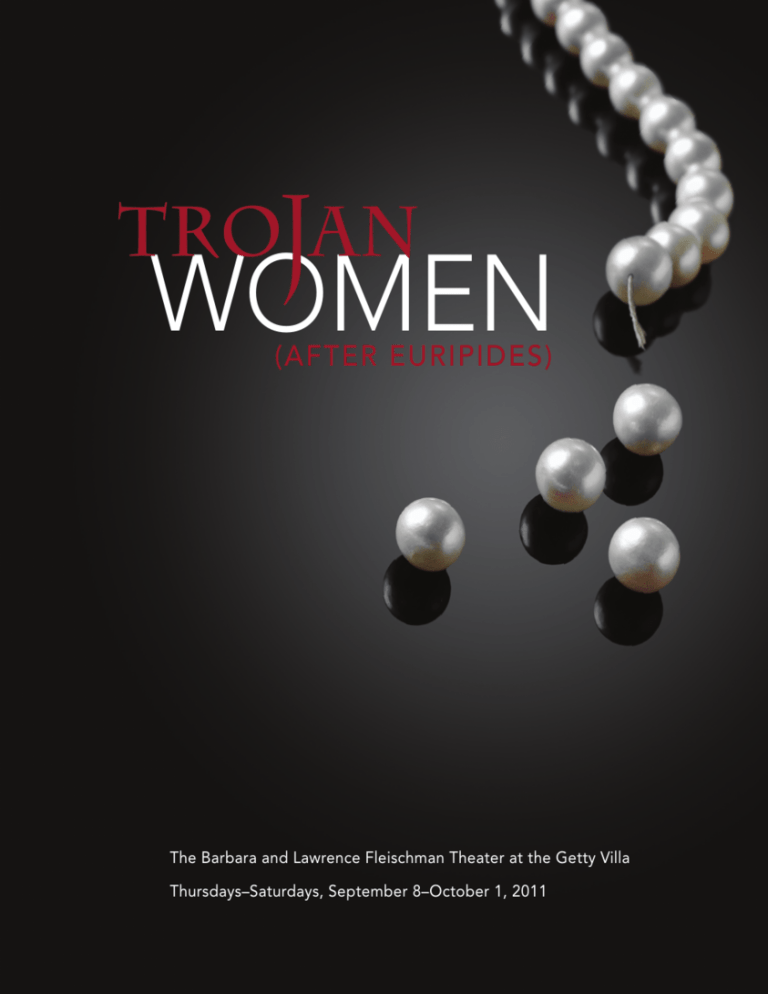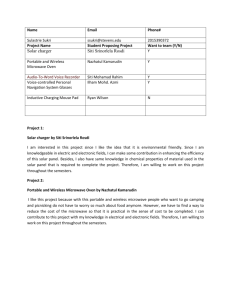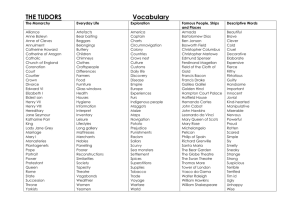Tro An Women
advertisement

j Women Tro an (After Euripides) The Barbara and Lawrence Fleischman Theater at the Getty Villa Thursdays–Saturdays, September 8–October 1, 2011 j Women Tro an (After Euripides) World Premiere Production at the Getty Villa Performed by SITI Company Directed by Anne Bogart Adapted by Jocelyn Clarke T HE E N SE M B L E (I N ORDER OF APPE AR A N CE ) Brent Werzner * Poseidon Barney O’Hanlon * Chorus Ellen Lauren * Hecuba Leon Ingulsrud * Talthybius Akiko Aizawa * Kassandra Makela Spielman * Andromache Katherine Crockett Helen J. Ed Araiza * Menelaus Gian-Murray Gianino * Odysseus T HE C O MPA N Y View of the Barbara and Lawrence Fleischman Theater and the entrance of the J. Paul Getty Museum at the Getty Villa The performance is approximately ninety minutes long, without intermission. Christian Frederickson Darlene Miyakawa * Composer and Performer of Original Music Stage Manager Marina McClure Assistant Director As a courtesy to our neighbors, we ask that you keep noise to a minimum while enjoying the production. Please refrain from unnecessarily loud or prolonged applause, shouting, whistling, or any other intrusive conduct during the performance. While exiting the theater and the Getty Villa, please do so quietly. Brian H Scott Lighting Designer *Member of Actors’ Equity Association, the Union of Professional Actors and Stage Managers in the United States. Sarah Krainin Designer Brian Scott is a member of the United Scenic Artists Union (USA). Darron L West Director Anne Bogart is a member of the Society of Stage Directors and Choreographers (SDC), an independent national labor union. Ellen L. Sandor Melissa Trn Sibyl Wickersheimer Claire Mannle Costume Designer Associate Scenic Designer Properties Coordinator Sound Consultant Wardrobe Crew Head Production Assistant David J. Roberts SITI Associate Producer Megan Wanlass SITI Executive Director d i r ect or ’ s not e Euripides’ Trojan Women enjoys a history of generating shudders of recognition and empathy from audiences of numerous cultures and throughout the centuries since it was first performed in 415 b.c. The success and longtime appeal of the play remains a mystery to scholars, who insist that Trojan Women is imperfect because nothing happens in it. Playwright/adapter Jocelyn Clarke and I share a fascination with how great plays adjust and reshape over time to find renewed significance in the moment of their realization. In the past forty years, productions of Trojan Women have referenced contemporary events such as Vietnam, Bosnia, the Israeli-Palestinian conflict, Iraq, European imperialism, the Holocaust, Hiroshima, Northern Ireland, and more. Productions of this play have reflected the adapters’ interests in existentialism, nihilism, ancient rites, Armageddon, shipwrecks, gender antagonism, and so forth, and have incorporated music, multimedia, ancient languages, choreography, operatic singing, ritual, and virtuosic acting. This play seems able to contain a multitude of interpretations with ease. In our approach to Trojan Women we are listening closely to the accumulated signals sent to us from the history of the work’s shifting shapes. We hope to land lightly and with a certain relevant exactitude on the hillside in front of the Getty Villa, sure-footed but in communion with the play’s mysteries and revelations. —Anne Bogart Why “( A f t e r E u r I P I Des) ”? A brief dedicatory note appears on the title page of Jocelyn Clarke’s text for tonight’s performance: SITI Company’s Trojan Women (after Euripides) is inspired by Homer, Euripides, Jean-Paul Sartre, Edith Hamilton, Roberto Calasso, Nikos Efthimopoulos, Caroline Alexander, Aristotle, David LaChapelle, Paul Roche, Robert Fagles, E. V. Rieu, Charles Rowan Beye, Simone Weil, Max Richter, Virgil, Barry S. Strauss, Eleni Karaindrou, and Alberto Manguel. This eclectic collection of influences is characteristic of this remarkable troupe’s multidimensional approach to staging the classics. The artists of SITI Company are not content to simply reinterpret each great dramatic work they encounter, rather they inevitably reinvent it. Whether it is a tragedy by Euripides, a comedy by Shakespeare, a medieval German morality play, a satiric Hollywood romp, or a landmark broadcast from the golden age of radio, the original material is transformed in the hands of this one-of-a-kind ensemble. Director Anne Bogart and playwright Jocelyn Clarke set out to craft this variation on Euripides’ Trojan Women with a handful of particular objectives in mind. Most notably, they felt the replacement of Euripides’ large, titular chorus of Trojan women with a single eunuch-priest would open up two new and distinct opportunities. First, the scale of the dramatic action immediately telescopes inward to focus on the domestic drama being played out among the four female survivors of the Trojan royal family: the queen, her priestess daughter, and her two extravagantly contrasting daughters-in-law. Having restructured Euripides’ action to keep the four women onstage together through much of the evening, this new retelling of their legend allows the complex relationships and festering resentments among them to rise slowly to the surface. Second, the inclusion of this newly invented priestly eunuch, so repulsive to the Greeks, allows a far greater distinction to be drawn between the religion of the Eastern-oriented Trojans (who worship a goddess of fertility in ecstatic and orgiastic festive rites) and that of the Greek invaders (whose worship has already settled on the Olympian gods so familiar to Euripides’ Athenian audiences). Thus the fall of Troy comes to represent not merely the defeat of one army by another, but the deathblow to an entire culture and its more feminized worldview. Furthermore, Clarke has replaced the souls of these Bronze Age royals with those of twentieth-century women. Some of the behavior of the high-born figures in this palace drama—which may well have made little or no sense to an ancient Athenian audience—is immediately recognizable to us, with images of the Russian Revolution, Holocaust, and Balkan wars all rattling around in our collective frame of reference. To cement the deal, SITI Company brings onstage a figure that dominates Euripides’ story, yet never appears in his play—the crafty Odysseus. A more modern Greek hero was never born, and he becomes the catalyst to the final act of the royal tragedy, driving it to its conclusion. Tonight’s play was not created by the artists of SITI Company to supplant Euripides’ ageless tragedy, but rather to stand alongside and converse with the ancient text—a thing of our own era, boldly inviting comparisons. —Norman Frisch, Project Specialist, Villa Public Programs SITI C O MPA N Y SITI Company was built on the bedrock of ensemble. We believe that through the practice of collaboration, a group of artists working together over time can have a significant impact on both contemporary theater and the world at large. Through our performances, educational programs, and collaborations with other artists and thinkers, SITI Company continues to challenge the status quo, to train to achieve artistic excellence in every aspect of our work, and to offer new ways of seeing and of being both as artists and as global citizens. SITI Company is committed to providing a gymnasium-for-the-soul where the interaction of art, artists, audiences, and ideas inspires the possibility for change, optimism, and hope. Founded in 1992 by Anne Bogart and Tadashi Suzuki, SITI Company began as an agreement to redefine and revitalize contemporary theater in the United States through an emphasis on international cultural exchange and collaboration. Originally envisioned as a summer institute in Saratoga Springs, New York, SITI expanded to encompass a year-round company based in New York City with a summer season in Saratoga. The Company is known nationally and internationally as a top-level artistic collective that generates groundbreaking theater while training artists from around the world. SITI COMPANY MEMBERS Akiko Aizawa, J. Ed Araiza, Anne Bogart, Will Bond, Gian-Murray Gianino, Leon Ingulsrud, Ellen Lauren, Kelly Maurer, Charles L. Mee, Jr., Elizabeth Moreau, Tom Nelis, Barney O’Hanlon, Neil Patel, James Schuette, Brian H Scott, Megan Wanlass, Stephen Webber, and Darron L West Board of Directors J. Ed Araiza, Anne Bogart, Gigi Bolt (Chair), Martha Coigney, Barbara Olsen Cummings, Lauren Flanigan, Rena Chelouche Fogel, Jason Hackett (Secretary), Chris Healy (Treasurer), Kim Ima, Kevin Kuhlke, Ellen Lauren, Thomas Mallon, Charles L. Mee, Jr., Barney O’Hanlon, and Leonard Perfido (Vice Chair) Staff and INterns Megan Wanlass (Executive Director); David J. Roberts (Associate Producer); Carly Hoogendyk, Tina Mitchell, and Jeremy Pickard (Interns) In addition to artistic director Anne Bogart, SITI Company is comprised of ten actors, four designers, a playwright, and an executive director. The company represents a change in thinking about the relationships between artists and institutions. SITI Company has partnered with theaters and venues around the world that present the Company’s work. Ellen Pearre Cason (Accountant), Maggie Elliott and James Harley (Graphic Designers), Chris Healy and Thomas Mallon (Attorneys), Jenny Lerner and Isabelle Doconinck (Press Agents), Al Foote (Web Programmer) SITI Company is grateful for the support of its foundation, government, and individual donors. Exclusive Worldwide Tour Representation: Rena Shagan Associates, New York shaganarts.com For a complete list of SITI funders and to learn more about SITI Company’s work, please visit www.siti.org. Consultants T HE En s emblE Akiko Aizawa’s (Kassandra) recent productions with SITI include Antigone, Radio Macbeth, bobrauschenbergamerica, Under Construction, Who Do You Think You Are, and American Document (2010). She has performed at the Brooklyn Academy of Music, American Repertory Theater, Arena Stage, LA Opera, Dance Theater Workshop, and Joyce Theater. Aizawa has appeared at festivals and venues in Edinburgh, Dublin, Bonn, Bobigny, Sydney, Bogotá, Tokyo, Toga, and Moscow. J. Ed Araiza (Menelaus), a SITI Company member, has a long history of working on multicultural and crossdisciplinary projects as a writer, director, and performer. His most recent Los Angeles appearance was in La Victima at the Los Angeles Theatre Center. Araiza’s recent SITI productions include Under Construction and Who Do You Think You Are. In November he will direct The Adding Machine at the University of California, Los Angeles; in January he will direct The Seagull in Windsor, Canada. As a playwright, Araiza has had seven original plays produced. Katherine Crockett (Helen) is a principal dancer with the Martha Graham Dance Company. She danced as Cate Blanchett’s double in The Curious Case of Benjamin Button and played Helen in Richard Move’s The Show (Achilles Heels) with Mikhail Baryshnikov. Crockett also has been a soloist dancer for Robert Wilson, Vanessa Redgrave, Susan Stroman, and designer Alexander McQueen. She is the lead actress in Tiny Dancer, a forthcoming feature film by Jayce Bartok. Gian-Murray Gianino (Odysseus) is the newest member of SITI. His works include Radio Macbeth, bobrauschenbergamerica, Freshwater, Who Do You Think You Are, and War of the Worlds—the Radio Play. He has been in many New York productions, including Or, ; Paradise Park; Eurydice; Al Pacino’s Salome readings (New York and Los Angeles); in addition to numerous regional and international theatrical credits. Gianino’s television work includes White Collar, Law & Order, Law & Order: SVU, and All My Children. He received his bachelor of arts from Wesleyan University. Leon Ingulsrud (Talthybius) helped found SITI Company. He has appeared in Orestes, Seven Deadly Sins (New York City Opera), Nicholas & Alexandra (LA Opera), bobrauschenbergamerica, Hotel Cassiopeia, Who Do You Think You Are, Radio Macbeth, Under Construction, Antigone, American Document (2010) with Martha Graham Dance Company, and War of the Worlds—the Radio Play. Ellen Lauren (Hecuba) is a founding member of and associate artistic director for SITI. She is an associate artist with the Suzuki Company of Toga (SCOT) in Japan, under the direction of Tadashi Suzuki (1993–present). Lauren received the Kosovar Award from the New York City Opera, in addition to a Theatre Communications Group Fox Fellowship for Distinguished Achievement (2008–10). She is a faculty member of the Juilliard School of Drama (1999–present). THE Com pany Barney O’Hanlon (Chorus) has been a SITI Company member since 1994 and has collaborated with Anne Bogart since 1986. He has performed internationally at the Dublin Theatre Festival, Edinburgh International Festival, Prague Quadrennial, MC93 Bobigny, Bonn Bienniale, and Festival Iberoamericano de Teatro de Bogotá. In New York, O’Hanlon has performed at the Brooklyn Academy of Music’s Next Wave Festival, the Public Theater, New York Theatre Workshop, Performance Space 122, New York City Opera, and Glimmerglass Opera. Makela Spielman (Andromache) has appeared with SITI Company in Antigone, Under Construction, Radio Macbeth, and Intimations for Saxophone. She has performed at Denver Center Theatre Company, Actors Theatre of Louisville, Arena Stage, Cincinnati Playhouse in the Park, Court Theatre, Keen Company, La Jolla Playhouse, Magic Theatre, the Shakespeare Theatre Company, and Folger Shakespeare Library. Spielman received her master of fine arts from the University of California, San Diego. Brent Werzner’s (Poseidon) work with SITI includes A Midsummer Night’s Dream. His television work includes Friday Night Lights. He has performed Mika for the United Nations and Secretary General Ban Ki Moon in recognition of the International Day for the Elimination of Violence against Women. Werzner is currently co-directing a feature documentary, In the Wings, which examines a mixedabilities theater ensemble in Vermont. Anne Bogart (Director) is the artistic director of SITI Company. Recent works with SITI include American Document (2010), Antigone, Under Construction, Freshwater, Who Do You Think You Are, Radio Macbeth, Hotel Cassiopeia, and Death and the Ploughman. She has also authored three books: A Director Prepares: Seven Essays on Art and Theatre; The Viewpoints Book: A Practical Guide to Viewpoints and Composition; and And Then, You Act: Making Art in an Unpredictable World. Jocelyn Clarke (Playwright) is a freelance dramaturge and writer. He is a member of the artistic staff of the Sundance Theatre Lab and has taught dramaturgy at the John F. Kennedy Center in Washington, D.C., and at Columbia University. Clarke is an associate artist with the Civilians and Theater Mitu in New York. He has written five plays for Anne Bogart and the SITI Company: Bob, Alice’s Adventures, Room, Score, and Antigone. Here You Are Human, his new project with the Tiger Lilies, was presented at the Archa Theatre during the Prague Quadrennial in May. Clarke’s adaptation of Flann O’Brien’s The Poor Mouth premieres at the Blue Raincoat Theatre in Sligo, Ireland, this October. Christian Frederickson (Composer and Performer of Original Music) is a founding member of Rachel’s, an instrumental band with six albums on Touch and Go Records. He is also part of the Young Scamels, whose Tempest is out now on iTunes. Recent credits include Palissimo’s The Painted Bird: Bastard (Part I) and Amidst (Part II) at La MaMa Experimental Theatre and Baryshnikov Arts Center, SITI’s Antigone at Dance Theater Workshop, The Emperor Jones at Irish Repertory Theatre (Lucille Lortel Award nomination), and Three Sisters at Classic Stage Company. Darlene Miyakawa (Stage Manager) is a freelance AEA/AGMA stage manager and is honored to be involved in this production and for being able to spend a summer with SITI Company. She recently stage managed the reading of this play in fall 2010. Miyakawa’s previous work at the Getty Villa includes stage managing the outdoor classical theater productions of Peace (2009) and Elektra (2010). David J. Roberts (SITI Associate Producer) focuses on general management and programs for the company. He is also a freelance producer and management consultant for various independent projects and organizations. Roberts was previously an associate managing director of Yale Repertory Theatre. He currently serves as board vice chairman for Palissimo. Roberts has a master of fine arts in theater management from the Yale School of Drama. Brian H Scott (Lighting Designer) has worked with SITI Company on American Document (2010), Antigone, Freshwater, Who Do You Think You Are, Radio Macbeth, Hotel Cassiopeia, systems/layers, and War of the Worlds—the Radio Play. With Rude Mechanicals, Scott has worked on The Method Gun, Lipstick Traces, Big Love, Cherrywood, and Matchplay. Scott worked at Classic Stage Company on The Age of Iron, Hamlet, Richard II, Richard III, and The Tempest. At Playwrights’ Horizons, he contributed to Dead Man’s Cell Phone, and with New York Theatre Workshop, Scott worked on Songs from an Unmade Bed. Melissa Trn (Costume Designer) has worked in New York on Antigone (SITI Company), From the Fire, My Sweet Charlie, What to Do when You Hate All Your Friends, Al’s Business Cards, Bully to You, Marilyn, The King Is Dead, New Works Festival (Columbia University), The Screens, Baal, The Sporting Life, The Erotic Diary of Anne Frank, and Spacebar. Regional work includes The Me Nobody Knows; Grace, or the Art of Climbing; and Richard II. Trn has a master of fine arts from the Yale School of Drama. Megan Wanlass (SITI Executive Director) has been a SITI member since 1995, where she has helped create over thirty shows. She received her arts-administration certificate from New York University, attended the Executive Program for Nonprofit Leaders at the Stanford Graduate School of Business, and was a member of the Arts Leadership Institute Charter Class at Teachers College at Columbia University. Wanlass holds a bachelor of arts in theater from Occidental College and currently serves on the board of Theatre Communications Group. Darron L West (Sound Consultant) is known nationally and internationally on and Off Broadway for his work in dance and theater, which has been heard in over four hundred productions. Among numerous nominations, his accolades for sound design include the Bay Area Critics Circle Award (2010), the Lucille Lortel and AUDELCO Awards (2006), Henry Hewes Design Award (2004 and 2005), the Princess Grace Award, the Village Voice OBIE Award, and the Entertainment Design Magazine EDDY Award. In addition to being a sound designer, West is also a founding member of Anne Bogart’s SITI Company and a former resident sound designer at Actors Theatre of Louisville. Sibyl Wickersheimer (Associate Scenic Designer) is an artist, set designer, and an assistant professor at the University of Southern California School of Theatre. Regionally, her credits include the Kirk Douglas Theatre, South Coast Repertory, Geffen Playhouse, Lookingglass Theatre Company, Berkeley Repertory Theatre, and the Disney Wonder ship. Wickersheimer recently designed a modular stage for Ice Age Encounters, the dinosaur-and-saber-toothed-cat performance at the Natural History Museum of Los Angeles County. Currently she is working on Mr. Rickey Calls a Meeting at Lookingglass Theatre Company and Big Haul with artist Janne Larsen. PERFO RM A N C E AT THE G ETT Y V I LLA The Getty Villa’s public programming enhances the experience of the ancient world by offering a diverse schedule of events anchored by an innovative theater program. Live performances of classical drama offer insight into the social, cultural, and political realities of life in ancient Greece and Rome; the J. Paul Getty Museum’s permanent collection of antiquities, alongside its changing exhibitions, strengthens the connection between modern audiences and the stories enacted in the tragedies and comedies onstage. Classical dramatists explored basic, human stories that often parallel our contemporary experiences. Ancient plays are ever powerful and resonant, continuing to inspire reinterpretation. The Villa Theater Lab series, presented throughout the year in the Auditorium, fosters experimental and contemporary approaches to ancient stories. The Auditorium’s technology enables directors, designers, musicians, playwrights, and actors freely to incorporate advanced stage, sound, and visual elements into productions developed in residence at the Villa. Each September, a major production is commissioned and presented in the Barbara and Lawrence Fleischman Theater, an outdoor performance space based on ancient prototypes. In recent years, the outdoor classical theater has been the setting for Euripides’ Hippolytos, Plautus’s Tug of War, the Agamemnon of Aeschylus, Aristophanes’ Peace (via Culture Clash), and Sophocles’ Elektra. These performances have become a much-anticipated end-of-summer tradition for Museum audiences, and plans are already well underway for a new version of Euripides’ rarely performed Helen in 2012. The Villa’s public programming also includes performances of music and dance, film screenings, and family festivals. To view our seasonal calendar of events, visit the Museum’s website at getty.edu or subscribe online to the monthly e-Getty newsletter to receive free programming highlights by e-mail. THE BA RBA RA AN D LAWRE NCE FL EISCHMAN TH EATER STA FF Performing Arts Manager Laurel Kishi Project SpecialistNorman Frisch Senior Staff Assistant Anna Woo Curatorial Liaison Kenneth Lapatin Technical Coordinator Adrienne Wohleen, Paradigm Shift Worldwide Lighting and Sound Operators Audiovisual Department House Management Visitor Services Department Public Programs Intern Dami Seung Additi onal pr odu cti on c redits Table Fabrication: Knack Studios, Drew Mendez and Ralph Wanlass Women’s Costume Construction: Timberlake Studios Poseidon and Chorus-suit Construction: Mr. Luigi Costume Assistant: Lisa Loen Prop Artisans: Sarah Krainin and Merrianne Nedreberg Lighting Equipment: Kinetic Lighting, Inc. Related Tal k After Euripides: A Conversation with Anne Bogart Join theater director Anne Bogart and J. Paul Getty Museum associate curator of antiquities Kenneth Lapatin as they discuss the creative process behind the staging of Trojan Women (after Euripides). Bogart shares how she, her SITI Company ensemble, and playwright Jocelyn Clarke pay homage to and deviate from Euripides’ masterpiece in significant ways. Saturday, October 1, 2:00 p.m. Getty Villa, Auditorium Free; a ticket is required. Call (310) 440-7300 or get tickets online at getty.edu. N E X T Y E A R AT T H E G ETTY VILLA HELEN By Euripides Directed by Jon Lawrence Rivera In a new adaptation by Nick Salamone A World Premiere Production by Playwrights’ Arena Opening September 6, 2012 Euripides, the most subversive of the great Greek dramatists, followed his Trojan Women just three years later by presenting an entirely alternative history of “Helen of Troy” in Helen (412 b.c.), a play now largely ignored and rarely performed. In Helen, Euripides’ heroine is no wanton seductress, but rather a pious, faithful wife and a hapless victim of Olympian plots who struggles to make the best of a very bad situation. By a trick of the gods, this Helen never travels to Troy at all, but is replaced by a phantom replica on the eve of her kidnapping by Paris. The real Queen Helen is magically transported by Hermes to Egypt in a cloud for safekeeping, where she waits out the Trojan War in an ironic celibacy. Helen picks up the story seventeen years later, as the abandoned, middle-aged queen remains stranded on the banks of the Nile, oblivious to her infamy and ignorant of the war’s outcome. As the play opens, the once-famous beauty wonders whether the gods, her husband, and the world have forgotten her forever. Needless to say, they have not, and Euripides’ inventive fantasy of mistaken identities and impossible coincidences ensues. MUSEUM/vertical.ep 6/8 point The J. Paul Getty Museum at the Getty Villa 1200 Getty Center Drive, Suite 1000v Los Angeles, CA 90049-1745 Tel 310 440 7300 www.getty.edu © 2011 J. Paul Getty Trust






